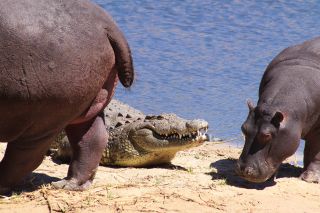Animal Behavior
Are Dogs Happier Than Cats?
...or are hippos happier than crocodiles?
Posted June 6, 2023 Reviewed by Michelle Quirk
Key points
- Some species experience greater pleasure (and pain) than others.
- Comparing welfare across species is a major problem for animal welfare science.
- Until we better understand animal sentience, we rely on experimental methods and species similarity judgments.

Imagine a zoo receives a substantial donation earmarked for improving the welfare (alternatively called well-being) of its species. How should they allocate these funds? The general public often overlooks the complexity of this challenge.
In a recently published article titled "Welfare Comparisons Within and Across Species," Heather Browning, a zookeeper turned philosopher, attempts to address this issue.
Let's consider some examples. The zoo could utilize the donation to buy a new, exciting toy for the lions. They could enlarge their penguin enclosure, or they could purchase a shelter to provide warmth for the zebras during the winter months. There are myriad potential uses for the donation for each species a zoo houses.
However, resources are finite, which is why zoo managers (in consultation with zookeepers and animal welfare experts) aim to allocate funds in a way that maximizes animal welfare. To achieve this, they need the ability to compare the welfare of different animals to determine which intervention would be most beneficial. For instance, does a hippo experience greater pleasure than a crocodile? If so, it would make more sense to provide the hippo with a new enrichment device.
This problem is arguably one of the most significant challenges facing animal welfare science—the field dedicated to understanding the well-being of animals.
Yet, while many methodologies have been proposed, Browning has voiced some critiques:
"All our available options for making welfare comparisons are imperfect, and we need to make explicit context-specific decisions about which will be best for the task at hand while acknowledging their potential limitations."
How to solve interspecies welfare comparison problems will depend on the practical problem we are dealing with. If we are only dealing with two alternative options, for instance, such as an expensive toy in one case versus a cheap enclosure to protect from cold weather, it may be easy to decide in virtue of one solution. Someone owning a cat and a dog may be faced with just such problems and have some intuitive grasp of how to solve them.
But for large-scale decisions, the problem of interspecies welfare comparisons will be much harder. The number of animals can vary substantially—think for instance of the number of chickens on farms. How do we evaluate animal welfare interventions or policies that could impact millions of animals?
In research, scientists have often moved to smaller animals with less complex nervous systems when painful experiments on some species have become controversial. There is an implicit assumption in such a move that a rat would suffer less than a monkey, but how can we scientifically address the question of how the welfare (or suffering) across species could be compared?
Ultimately, there is a need for a lot of future research. As Browning argues:
"More than anything else, we’re in need of further research. Only through gaining a better understanding of the subjective experiences that make up welfare—how they evolved and how they function—can we establish a firm empirical base from which to justify our comparisons."
Once we develop a better understanding of animal sentience (the capacity for positive and negative feelings), we will be in a better position to assess the welfare ranges of different animals. Until then, we will have to rely on a variety of experimental methods and similarity judgments between species, such as how distantly two species are related, to make a plausibly significant difference in their capacity for welfare.
Facebook image: vvvita/Shutterstock
LinkedIn image: Africa Studio/Shutterstock
References
Browning, H. Welfare comparisons within and across species. Philos Stud 180, 529–551 (2023). https://doi.org/10.1007/s11098-022-01907-1


